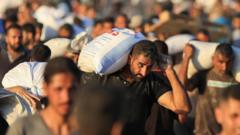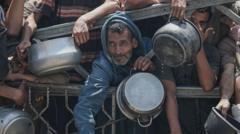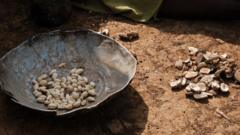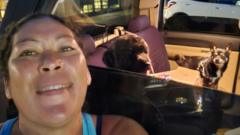In a poignant tale of survival and hope, baby Siwar Ashour, a malnourished six-month-old, has been evacuated from Gaza to Jordan in search of critical medical treatment. Weighing only 3kg (6.6lb), she is barely alive, her frail cries echoing the resilience of an innocent caught in the crossfire of war. Accompanied by her family, Siwar’s journey represents not just her struggle for life, but the ongoing plight of countless children in similar circumstances amid the brutal realities of conflict.
A Lifeline for Gaza: Baby Siwar's Treacherous Journey to Treatment
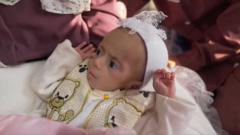
A Lifeline for Gaza: Baby Siwar's Treacherous Journey to Treatment
A heart-wrenching evacuation as malnourished baby Siwar escapes Gaza for vital care in Jordan.
A frail cry and relief: Malnourished baby Siwar evacuated from Gaza is a story of resilience and survival, shedding light on the dire consequences of prolonged conflict.
The cry was frail but I could hear Siwar Ashour even before she was carried out of the coach. It was the cry of a voice that won't give up, of a child born in this war and who has now, for a while at least, managed to escape it.
In person, six-month-old Siwar is tinier than any visual image can convey. She weighs 3 kg (6.6 lb), but should be twice that. Her mother, Najwa, 23, smiled as she described her feelings on crossing into Jordan on Wednesday, when her daughter was evacuated from Gaza with other Palestinian children. The first thing she noticed was the quiet.
"It feels like there is a truce," she told me. "We will spend our night without rockets and bombing with God's will." Siwar was also accompanied by her grandmother Reem and her father Saleh, who is blind.
"The first and last goal of this trip is Siwar," said Saleh. "We want to get her to a safe shore. I want to make sure she is safe and cured. She's my daughter, my own flesh and blood. And I'm so deeply worried about her."
Reem carried Siwar off the bus onto Jordanian soil, forming her fingers into a V sign as she came. "Until now, I can't believe that I have arrived in Jordan. I saw King Abdullah's photo at the border and I felt so happy I got off the bus and made the sign of victory…for the sake of Siwar."
Back in April, when the BBC first filmed Siwar at Nasser Hospital in southern Gaza, her mother and doctor said she was suffering from malnutrition due to the scarcity of special milk formula. Her body was emaciated. Najwa said then she could not breastfeed Siwar because she herself was also malnourished. Tins of milk formula were delivered by the Jordanian Field Hospital and private fundraisers, but with an ongoing Israeli blockade on aid, Siwar's condition required far more comprehensive testing and treatment than Gaza could provide.
A deal was announced between King Abdullah and US President Donald Trump in February, allowing Jordan to bring 2000 seriously ill children to Amman for treatment. Gaza's devastated healthcare system could not cope with the escalating levels of sickness and those wounded by war. Since March, 57 children along with 113 family escorts have been evacuated. Sixteen children came on Wednesday, including Siwar.
Cradled in her grandmother's arms, Siwar stared with her large eyes at the unfamiliar crowds of police, medical workers, and journalists at the border. She was taken to an air-conditioned hall where Jordanian medics handed out drinks and food to the children. There was peace and plenty.
What was most striking was the exhaustion of parents and children alike. In several months of covering these evacuations, this latest event appeared to encapsulate a communal trauma. All families knew the anguish of being uprooted by conflicts or the desperation of searching for basic needs. Najwa recalls a time she took Siwar to the hospital, only to be separated from Saleh for two months as he searched for assistance.
"I thought she would be gone for just three or four days and then come back," he recalled. "But I was shocked that it dragged on...and eventually I realized that her condition is very serious and difficult."
As we traveled from the border to Amman, Najwa, who is pregnant, fell into a deep sleep. Siwar remained awake in her grandmother's arms. On the same ambulance were two boys suffering from cancer, along with their mothers and younger siblings—one boy, just four, cried out of fear and fatigue.
After an hour, we reached Amman, where Siwar was gently transitioned into the care of a nurse and then another ambulance. Over the coming days, she will receive the treatment that is all but impossible under Gaza's dire conditions. And for her family, the days ahead promise a respite filled with hope rather than fear.
With additional reporting by Alice Doyard, Suha Kawar, Matthew Goddard, and Malaak Hassouneh.
The cry was frail but I could hear Siwar Ashour even before she was carried out of the coach. It was the cry of a voice that won't give up, of a child born in this war and who has now, for a while at least, managed to escape it.
In person, six-month-old Siwar is tinier than any visual image can convey. She weighs 3 kg (6.6 lb), but should be twice that. Her mother, Najwa, 23, smiled as she described her feelings on crossing into Jordan on Wednesday, when her daughter was evacuated from Gaza with other Palestinian children. The first thing she noticed was the quiet.
"It feels like there is a truce," she told me. "We will spend our night without rockets and bombing with God's will." Siwar was also accompanied by her grandmother Reem and her father Saleh, who is blind.
"The first and last goal of this trip is Siwar," said Saleh. "We want to get her to a safe shore. I want to make sure she is safe and cured. She's my daughter, my own flesh and blood. And I'm so deeply worried about her."
Reem carried Siwar off the bus onto Jordanian soil, forming her fingers into a V sign as she came. "Until now, I can't believe that I have arrived in Jordan. I saw King Abdullah's photo at the border and I felt so happy I got off the bus and made the sign of victory…for the sake of Siwar."
Back in April, when the BBC first filmed Siwar at Nasser Hospital in southern Gaza, her mother and doctor said she was suffering from malnutrition due to the scarcity of special milk formula. Her body was emaciated. Najwa said then she could not breastfeed Siwar because she herself was also malnourished. Tins of milk formula were delivered by the Jordanian Field Hospital and private fundraisers, but with an ongoing Israeli blockade on aid, Siwar's condition required far more comprehensive testing and treatment than Gaza could provide.
A deal was announced between King Abdullah and US President Donald Trump in February, allowing Jordan to bring 2000 seriously ill children to Amman for treatment. Gaza's devastated healthcare system could not cope with the escalating levels of sickness and those wounded by war. Since March, 57 children along with 113 family escorts have been evacuated. Sixteen children came on Wednesday, including Siwar.
Cradled in her grandmother's arms, Siwar stared with her large eyes at the unfamiliar crowds of police, medical workers, and journalists at the border. She was taken to an air-conditioned hall where Jordanian medics handed out drinks and food to the children. There was peace and plenty.
What was most striking was the exhaustion of parents and children alike. In several months of covering these evacuations, this latest event appeared to encapsulate a communal trauma. All families knew the anguish of being uprooted by conflicts or the desperation of searching for basic needs. Najwa recalls a time she took Siwar to the hospital, only to be separated from Saleh for two months as he searched for assistance.
"I thought she would be gone for just three or four days and then come back," he recalled. "But I was shocked that it dragged on...and eventually I realized that her condition is very serious and difficult."
As we traveled from the border to Amman, Najwa, who is pregnant, fell into a deep sleep. Siwar remained awake in her grandmother's arms. On the same ambulance were two boys suffering from cancer, along with their mothers and younger siblings—one boy, just four, cried out of fear and fatigue.
After an hour, we reached Amman, where Siwar was gently transitioned into the care of a nurse and then another ambulance. Over the coming days, she will receive the treatment that is all but impossible under Gaza's dire conditions. And for her family, the days ahead promise a respite filled with hope rather than fear.
With additional reporting by Alice Doyard, Suha Kawar, Matthew Goddard, and Malaak Hassouneh.








